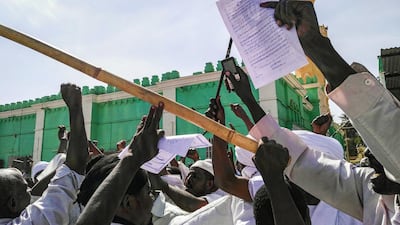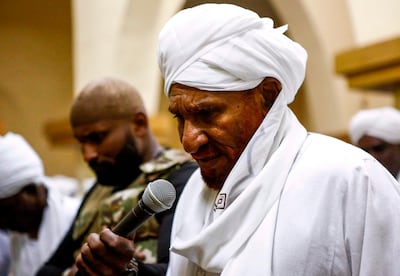Sudan's main opposition leader Sadiq Al Mahdi has called for President Omar Al Bashir to step down, throwing his support behind anti-government demonstrators after weeks of deadly protests.
Demonstrations have rocked the east African country since December 19, prompted by a government decision to triple the price of bread.
Since then 30 people have died in protest-related violence, according to officials, while rights group put the death toll at more than 40.
"This regime has to go immediately," Mr Al Mahdi told hundreds of worshippers attending Friday prayers at a mosque in Omdurman, the twin city of the capital Khartoum, which has seen near daily anti-government protests.
Mr Al Mahdi, whose government was toppled by Mr Al Bashir in a 1989 coup, has been a fixture of Sudanese politics since the 1960s. After nearly a year in exile, he returned to Sudan last month on the same day protests began.
Echoing calls by protesters for Mr Al Bashir to resign, the opposition chief gave an even higher death toll for the demonstrations.
"More than 50 people have been killed since December," said Mr Al Mahdi,
He backed the Sudanese Professionals' Association (SPA), an umbrella group of doctors, teachers and engineers which is leading demonstrations.
"A period of transition will come soon ... we are supporting this movement," said Mr Al Mahdi.
He said his party had signed "a document for change and freedom" with the SPA.
While Mr Al Mahdi's Umma Party has served as Sudan's main opposition group, regularly campaigning against government policies, analysts say the SPA-led protest movement has emerged as the biggest challenge yet to Mr Al Bashir's rule.
"Together we will hold peaceful demonstrations in Sudan and outside of Sudan," Mr Al Mahdi said, condemning the use of "live ammunition" against protesters.
Following Mr Al Mahdi's address, worshippers marched out of the mosque chanting the protest movement's slogan: "freedom, peace, justice".
But the demonstrators were quickly confronted by riot police who fired tear gas, witnesses said.
Protesters also took to the streets in Khartoum's eastern district of Burri, burning tyres and rubbish, according to onlookers who said the rally was also met with tear gas.
Late on Friday, protesters rallied in the capital's southern neighbourhoods of El Kalakla and Soba but there too they were confronted with tear gas, witnesses said.
"There were some illegal gatherings today in Khartoum and some other states but they were dispersed using tear gas," police spokesman General Hashim Abdelrahim said.
The SPA has stepped up pressure on the government with calls for daily demonstrations. Sudan's feared National Intelligence and Security Service has launched a sweeping crackdown on protesters that has seen hundreds jailed, including journalists, opposition leaders and activists.
This has triggered widespread international criticism, including from the United Nations and the United States.
Mr Al Bashir, 75, has remained steadfast in rejecting calls from demonstrators to step down, and has blamed "infiltrators" among the protesters for the violence.
He has accused the US of causing Sudan's economic woes, but his words have fallen on increasingly deaf ears as people have struggled to buy even basic foods and medicines.
Washington imposed a trade embargo on Sudan in 1997, which was only lifted in October 2017.


